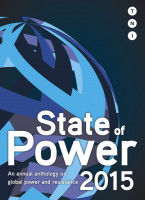The State of Peace: An Exercise in Doublethink
While most debates attempt to explain why the adaptation of Western institutions and norms to other contexts is easier said than done, this paper takes issue on a more fundamental level. It scrutinises the peace that common-sense suggests we are living in. It argues that while war is the violent reordering of power relations, the current state of peace is the violent maintenance of power relations.

Authors
Abstract
The underlying assumption of the liberal peace paradigm is that thanks to its socio-economic system the West is living in peace. Its model should, hence, be emulated by war-torn and poverty-stricken societies of the Global South. Yet, recent upheavals in the Middle East evidence once again how simplistic this understanding is.
While most debates attempt to explain why the adaptation of Western institutions and norms to other contexts is easier said than done, this paper takes issue on a more fundamental level. It scrutinises the peace that common-sense suggests we are living in. It argues that while war is the violent reordering of power relations, the current state of peace is the violent maintenance of power relations.
Social order in the world’s centre is maintained by a constant struggle to defend peace against alleged enemies with a combination of warfare in the world’s periphery and increasingly de-territorialised biopolitics.
Introduction
“Ignorance is Strength. Slavery is Freedom. War is Peace”
This is the slogan of the totalitarian party that is ruling the fictive mega-state Oceania in George Orwell’s dystopia 1984. It explains how the exploitative regime is able to maintain its control over the masses and perpetuate the societal hierarchy by manipulating the truth, keeping the population enslaved in the economic system, and waging an unending war.
Orwell’s forbidden book within the book “The Theory and Practice of Oligarchical Collectivism” explains that this eternal war: “is merely an imposture. [...] But though it is unreal it is not meaningless. [...] The war is waged by each ruling group against its own subjects, and the object of the war is not to make or prevent conquest of territory, but to keep the structure of society intact. The very word ‘war,’ therefore, has become misleading.”
In common-sense perception these dystopian predictions for the year 1984 are proven wrong. Europe is viewed as enjoying its longest period of enduring peace since the end of the Second World War. The underlying assumption of the liberal peace paradigm is that thanks to its socio-economic system the West is living in peace and, thus, its model should be emulated by war-torn and poverty-stricken societies of the Global South.
Yet, recent upheavals in the Middle East, particularly the dramatic advances by the Islamic State (IS) group in post-invasion Iraq, evidence once again how simplistic this understanding is. While most debates attempt to explain why the adaptation of Western institutions and norms to other contexts is easier said than done, the following discussion takes issue on a more fundamental level. It scrutinises the peace that common-sense suggests the West is living in.
The essay concludes that peace is not the absence of direct or structural violence. Peace is rather a process of maintaining the social order that prevailed in a former war. It argues that while war is the violent reordering of power relations, peace is the violent maintenance of power relations.
As will be shown, the West maintains these relations with a constant struggle to defend its peace against alleged external and internal enemies with a combination of direct warfare in the world’s periphery and biopower at the domestic level. With globalization the distinction between internal and external enemies has become increasingly obsolete and global governance has gradually displaced the state in its role to defend peace through merging warfare and increasingly de-territorialised biopolitics.
To develop these arguments, the essay will first discuss the inherently violent nature of real-world peace as a regime that is mainly concerned to maintain itself and the social order it is based on. Against this background, it will illustrate how modern states have come to defend their peace regimes against real or alleged enemies. To do so the discussion will centre on the defence against internal threats with population control techniques that Foucault termed biopower.
The next chapter will show how states in the world’s centre defend peace against external enemies through warfare in the world’s periphery. Building on that, the essay will exemplify how global governance has taken over the state’s role in defending peace against an increasingly global enemy.
